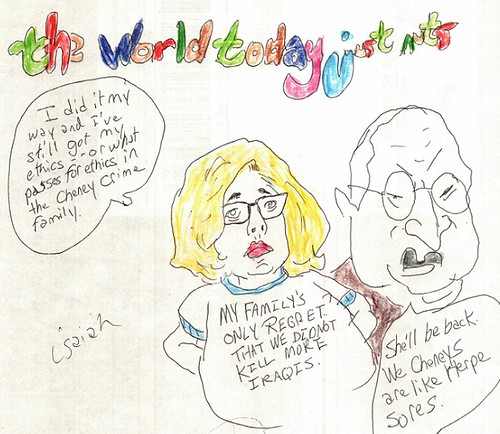Isaiah's THE WORLD TODAY JUST NUTS "Good Riddance To Bad Rubbish" went up tonight.
Now it is time to note a video about the assassination of President John F. Kennedy. The government will not tell us the truth, it will not release the records. All these years later, they are still covering up.
This is C.I.'s "Iraq snapshot" for today:
Wednesday, August 17, 2022. Look to the monkeypox failures to see how poorly Joe Biden's doing as president, Moqtada al-Sadr is accused of resorting to attempted murder (again), and much more.
Isabella A. Liberman (THE ADVOCATE) reports:
Jonathan Van Ness has slammed the U.S. government's response to monkeypox (MPV), saying that it is “fueled by homophobia and transphobia.”
In the essay published on Monday in Time, Van Ness breaks down the moment the first case of MPV was confirmed in the U.S. to now.
“When an outbreak affects mainly men who have sex with men, some portion of our elected legislators will have no incentive to act,” the nonbinary Queer Eye star wrote.
The first case of MPV was identified in the U.S. on May 18. Since then, the CDC reported 11,890 confirmed cases.
Yes, it is a government failure. Joe Biden doesn't know what the hell he's doing and refused to address it seriously. And that's why you don't make dottering old fools presidents. Dan Diamond, Fenit Nirappil and Lena H. Sun (WASHINGTON POST) report:
But after Health and Human Services officials announced their proposal on Aug. 4, Paul Chaplin, chief executive of Bavarian Nordic, the vaccine’s manufacturer, called a senior U.S. health official and accused the Biden administration of breaching its contracts with his company by planning to use the doses in an unapproved manner. Even worse, said two people with knowledge of the episode, Chaplin threatened to cancel all future vaccine orders from the United States, throwing into doubt the administration’s entire monkeypox strategy.
“People are begging for monkeypox vaccines, and we’ve just pissed off the one manufacturer,” said one official who spoke on the condition of anonymity because they were not authorized to comment.
For two months, the Biden administration has been chased by headlines about its failure to order enough vaccines, speed treatments and make tests available to head off an outbreak that has grown from one case in Massachusetts on May 17 to more than 12,600 this week, overwhelmingly among gay and bisexual men. And 100 days after the outbreak was first detected in Europe, no country has more cases than the United States — with public health experts warning the virus is on the verge of becoming permanently entrenched here.
“I think there’s a potential to get this back in the box, but it’s going to be very difficult at this point,” Scott Gottlieb, who led the Food and Drug Administration under Donald Trump and has advised the Biden administration on its response to public health outbreaks, said on CBS’s “Face the Nation” last week.

Many of the people who say they love LGBT people hate them. The biggest enemies of LGBT people are actually their “allies.” The most homophobic people in the world are people who are afraid of telling LGBT people the truth.
Monkeypox is evidence of this. The “allies” of LGBTQ people in politics and media are refusing to tell gay men the truth about monkeypox.
According to the World Health Organization, 95% of people infected with monkeypox are gay men.
However, though this current outbreak has been mostly transmitted through sexual acts between gay men, the World Health Organization and the Centers for Disease Control and Prevention say monkeypox isn’t a sexually transmitted disease.
This is from the World Health Organization:
Human monkeypox was first identified in humans in 1970 in the
Democratic Republic of the Congo in a 9-month-old boy in a region where
smallpox had been eliminated in 1968. Since then, most cases have been
reported from rural, rainforest regions of the Congo Basin, particularly
in the Democratic Republic of the Congo and human cases have
increasingly been reported from across central and west Africa.
Since
1970, human cases of monkeypox have been reported in 11 African
countries: Benin, Cameroon, the Central African Republic, the Democratic
Republic of the Congo, Gabon, Cote d’Ivoire, Liberia, Nigeria, the
Republic of the Congo, Sierra Leone and South Sudan. The true burden of
monkeypox is not known. For example, in 1996–97, an outbreak was
reported in the Democratic Republic of the Congo with a lower case
fatality ratio and a higher attack rate than usual. A concurrent
outbreak of chickenpox (caused by the varicella virus, which is not an
orthopoxvirus) and monkeypox was found, which could explain real or
apparent changes in transmission dynamics in this case. Since 2017,
Nigeria has experienced a large outbreak, with over 500 suspected cases
and over 200 confirmed cases and a case fatality ratio of approximately
3%. Cases continue to be reported until today.
Monkeypox is a disease of global public health importance as it not only affects countries in west and central Africa, but the rest of the world. In 2003, the first monkeypox outbreak outside of Africa was in the United States of America and was linked to contact with infected pet prairie dogs. These pets had been housed with Gambian pouched rats and dormice that had been imported into the country from Ghana. This outbreak led to over 70 cases of monkeypox in the U.S. Monkeypox has also been reported in travelers from Nigeria to Israel in September 2018, to the United Kingdom in September 2018, December 2019, May 2021 and May 2022, to Singapore in May 2019, and to the United States of America in July and November 2021. In May 2022, multiple cases of monkeypox were identified in several non-endemic countries. Studies are currently underway to further understand the epidemiology, sources of infection, and transmission patterns.
Transmission
Animal-to-human
(zoonotic) transmission can occur from direct contact with the blood,
bodily fluids, or cutaneous or mucosal lesions of infected animals. In
Africa, evidence of monkeypox virus infection has been found in many
animals including rope squirrels, tree squirrels, Gambian pouched rats,
dormice, different species of monkeys and others. The natural reservoir
of monkeypox has not yet been identified, though rodents are the most
likely. Eating inadequately cooked meat and other animal products of
infected animals is a possible risk factor. People living in or near
forested areas may have indirect or low-level exposure to infected
animals.
Human-to-human transmission can result from close
contact with respiratory secretions, skin lesions of an infected person
or recently contaminated objects. Transmission via droplet respiratory
particles usually requires prolonged face-to-face contact, which puts
health workers, household members and other close contacts of active
cases at greater risk. However, the longest documented chain of
transmission in a community has risen in recent years from 6 to 9
successive person-to-person infections. This may reflect declining
immunity in all communities due to cessation of smallpox vaccination.
Transmission can also occur via the placenta from mother to fetus (which
can lead to congenital monkeypox) or during close contact during and
after birth. While close physical contact is a well-known risk factor
for transmission, it is unclear at this time if monkeypox can be
transmitted specifically through sexual transmission routes. Studies are
needed to better understand this risk.
The US State Department on Tuesday urged the Iraqi and Kurdish governments to determine a way that supports “existing and future” investments as looming disputes between Erbil and Baghdad could set back those interests.
“We have been and we encourage the parties to determine a way forward that supports existing and future investments” in Iraq and the Region, department Spokesperson Ned Price said in response to Rudaw’s question during his daily briefing on Tuesday.
"Any dispute between Baghdad and Erbil has the potential to set back those interests and the interest that we do share with the people of Iraq and Kurdish people as well,” Price added.
The remarks come a day after the US Senate Foreign Relations Committee called for the “highest level” US engagement in the Kurdistan Region.
“We urge you immediately to engage at a high-level with the KRG and the Iraqi government to safeguard the economic stability of the [Kurdistan Region of Iraq],” the lawmakers wrote in a letter directed to President Joe Biden’s administration.
Finance Minister Ali Abdul-Amir Allawi resigned today amidst Iraq's continuing political crisis.
Prime Minister Mustafa al-Kadhimi, who tried to change Allawi's mind before the meeting, ultimately accepted his resignation.
Kadhimi appointed current Oil Minister Ihsan Abdul Jabbar to head the Finance Ministry in addition to his other position.
Dozens of tribesmen gathered in the southern province of Muthanna on Monday night displaying their weapons while firing into the air as they vowed to revenge against anyone affiliated with an Iraqi lawmaker’s alleged assassination attempt a day prior.
Independent MP Bassim Khashan and supporters from his tribe - al-Barki - accused Muqtada al-Sadr’s Saraya al-Salam militia of having attempted to assassinate him by attacking his motorcade in the town of Affak in Samawa on Sunday, due to criticisms allegedly published against Sadr on Khashan’s social media platforms.
"These fresh-blooded young people are all here because they know that aggression has been committed not against an individual only, but the entire tribe. They consider this attack of aggression against the state,” Khashan told Rudaw’s Mustafa Goran.
Meanwhile, James Zogby Tweets:
Haven't read the article. Avoided it out of fear that it's written by Jane Arraf -- there's only so much a person can take in one day.
The following sites updated:


